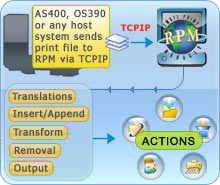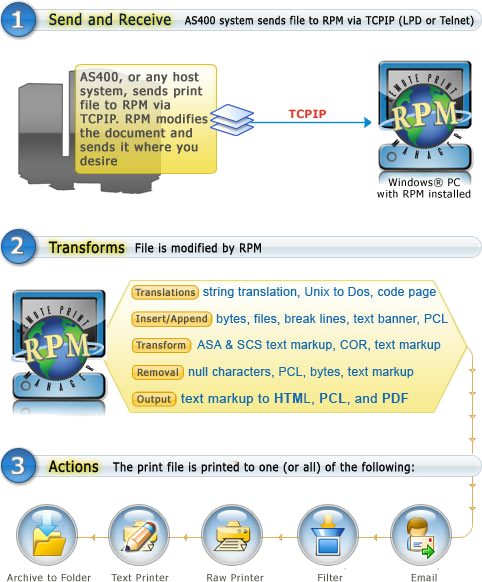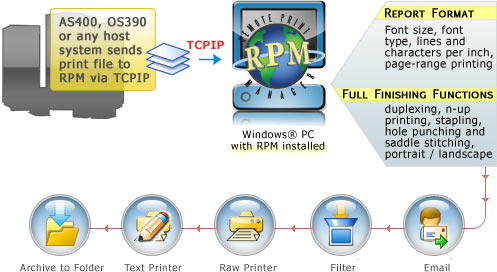IT managers and system administrators have long sought to make AS/400-based data available in Windows environments. With RPM Remote Print Manager® (RPM(, AS/400 host data can be sent to Windows-based printers or accessed on Windows-based systems. The result is lower costs, more flexibility, and more convenience.
 The challenge of freeing host data and making it available on other platforms, namely Windows, is more straightforward and less expensive than you might think. And using host data within Windows environments provides several advantages:
The challenge of freeing host data and making it available on other platforms, namely Windows, is more straightforward and less expensive than you might think. And using host data within Windows environments provides several advantages:
- Increased data availability: When key players have access to host data, they can make better decisions and incorporate the data in critical business processes.
- Connected cross-platform applications: Peripheral applications often reside on Windows PCs or servers, and these applications need access to the data residing on the host.
- Lower print costs: Because Windows-based printers are common, inexpensive, and relatively easy to maintain, printing AS/400 data to them lowers printing costs.
- Increased print convenience and flexibility: By placing Windows-based printers in key locations, printouts are easy to pick up, and new printers can be added to the network when needed.

Using RPM in your AS/400 Host Environment is Easy and Advantageous
Minimum host-side modifications
- Putting RPM in place requires little change to the AS/400.
- In most cases, the host printer must be redirected to RPM's IP address.
Advanced formatting and finishing capabilities
Host data can be formatted for a specific Windows printer allowing full use of all printer finishing functions, including double-sided printing, stapling, hole punching, n-up, watermarks, etc. You can use your desktop printer or regular office printer to receive and customize AS/400 print files.

RPM also supports margins, fonts, and text compression including other data massaging options like PCL removal, ASA/Fortran, CR to CR/LF, codepage conversion, and SCS to ASCII. There is no need to purchase a larger AS/400 specific network printer to support the AS/400 print commands. RPM will do this natively to any of your existing printers.
AS/400 iSeries SCS to ASCII Conversion
Easy AS/400 Forms & Check Printing
RPM allows you to easily format the margins, lines-per-inch, and more to adjust the output to fit your pre-printed forms. No more specialized printer is needed to print your forms or checks.
RPM enhances printing time and reduces CPU usage on the AS/400. RPM can interpret SCS codes and translate them to ASCII.
- For non-text printing, RPM creates line-oriented output using carriage return for overstrikes as appropriate.
- For text output, RPM preserves the SCS markup and reproduces attributes such as margins, font size, character position, etc.
AS/400 Printing Host Print Transform
The AS/400 Host Print Transform converts the EBCDIC characters to ASCII and converts the SCS formatting instructions to a supported Manufacturer Type and Model printer language (PCL or FX80). RPM passes the incoming transformed preformatted data directly to the printer. Very high throughput and printer-friendly for the supported printers.
RPM's AS/400 Printing Queues
RPM's Printing Queues for AS/400 Mainframe to PC Printing: RPM's ability to handle many text formats intelligently while providing a simple interface, has been a key reason for IT professionals to make the switch from their existing AS/400 printing setup to RPM.
Apply Transforms and Actions to your AS/400 Printing
- Easily email AS/400 spool files to one or multiple recipients.
- Convert the spool file to PDF or HTML for an easy print file archive.
- Print job is captured to process with an application or saved to a file.
- RPM checks for duplicate filenames before saving and has many file naming options.
- RPM will integrate third-party software and solutions into RPM.
- There is no need for any extensive AS/400 printer configurations.
- Easily format Legacy "greenbar" paper reports.
- Formatting capabilities: modify margins, control fonts, wrap or truncate lines, bold and overstrike, and more.
- Print from the AS/400 to unsupported PC print devices.
- RPM passes raw information from the AS/400 to the PC print queue.
- Receiving files with RPM bypasses the Windows print driver.
- RPM processes print data without modification as if the printer were connected directly to the host system through a parallel or serial connection.
AS/400 Printing Case Studies & Uses
- Replace SNA A large state agency has saved millions of dollars directing host print jobs to locally attached parallel cable and USB-attached printers, replacing green screens with PCs and emulators, and using TCP/IP in place of SNA. Printouts are conveniently available, and printer costs are significantly lower.
- Host Label Printing A hospital information system provider creates labels from AS/400 healthcare applications. Host data is sent to RPM, which performs transformations: SCS is converted to ASCII, orientation is changed from portrait to landscape, the font is changed to Tahoma 10pt, lines per inch are changed to 8, and page margins are altered. Patient or pharmacy labels are then printed correctly to a Windows-based local or network thermal label printer. (host label printing case study )
- Banking Archives At a national bank, RPM receives jobs from an AS/400, converts SCS to ASCII, and saves the transformed jobs to disk. A storage solution then picks up the jobs for processing and archiving.
- Convenient Delivery A wholesale company uses RPM for accounting: an AS/400 holds accounting worksheets that are sent to RPM on the accounting manager's PC. The worksheets are saved in a folder on this local machine, and the manager then places them in other folders or distributes them to others. The AS/400-side process is simple: the OUTQs are pointed to RPM.
- University Printing A registrar's office uses RPM Elite for printing transcripts and other documents. Print jobs go to line printers sent from the host system, but there are PCL escape codes that need to be taken out and others inserted by RPM. Also, depending on the formatting that needs to be done, jobs are directed to different queues, then the jobs go to 1 of the 22 printers in the office.
- Compliance Records An investing firm receives transaction records from a vendor. The jobs arrive on 30 different IP addresses, with each address corresponding to a queue within RPM. RPM saves each record to disk for auditing purposes.